2013年七年级英语下册 Unit 12 What did you do last weekend Section A-1课件 (新版)人教新目标版
七年级英语下册unit12_What_did_you_do_last_weekend_Section_A_2
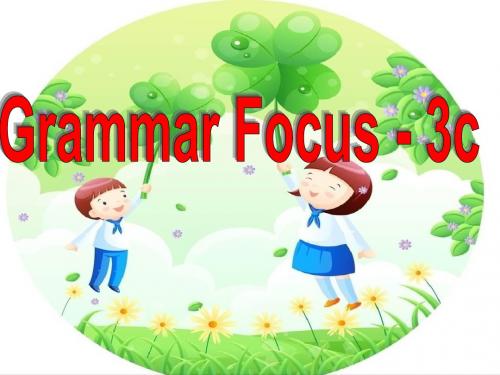
7. 她去了农场。
____________________________ She went to the farm.
8. 她和谁一起去的?
____________________________ Who did she go with?
9. 她和她的同学们一起去的。 She went with her classmates. ____________________________
1. A: ______ What did you do last weekend? B: I played badminton on Saturday. A: Sounds fun! _____ Who did you play with? B: I played with my father. He’s really good!
阅读Grammar Focus部分,完成
下列句子。 1. 上个周末你做什么了? What did you do last weekend? ___________________________ 2. 我做了我的家庭作业。 I did my homework. __________________
_____ Why _____ were you late yesterday?
2. 特殊疑问词 + did + 动词原形 + 主语 +其 他? 昨天他做了什么事情? _____ What ____ did he do yesterday? 上个周末她参观了什么地方? ______ Where ____ did she _____ visit last weekend? 你和谁一起去的动物园? ____ Who ____ did you go to the zoo _____? with 他们什么时候到达北京的? _____ When ____ did they arrive in Beijing?
人教版七年级英语 下册Unit 12 What did you do last weekend学案
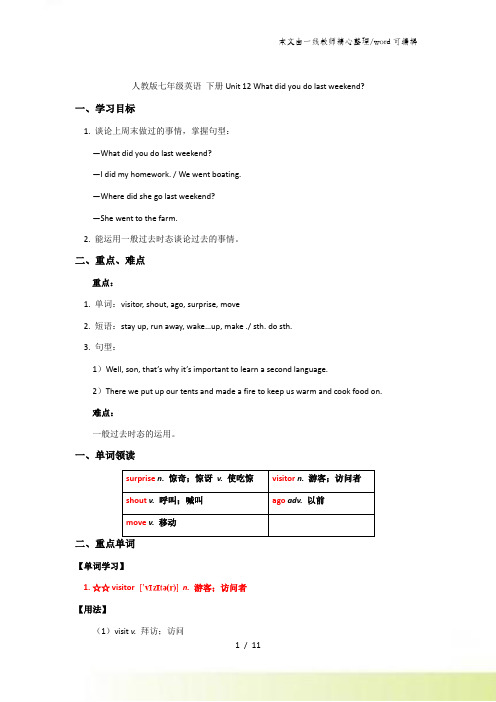
人教版七年级英语下册Unit 12 What did you do last weekend?一、学习目标1. 谈论上周末做过的事情,掌握句型:—What did you do last weekend?—I did my homework. / We went boating.—Where did she go last weekend?—She went to the farm.2. 能运用一般过去时态谈论过去的事情。
二、重点、难点重点:1. 单词:visitor, shout, ago, surprise, move2. 短语:stay up, run away, wake…up, make ./ sth. do sth.3. 句型:1)Well, son, that’s why it’s important to learn a second language.2)There we put up our tents and made a fire to keep us warm and cook food on.难点:一般过去时态的运用。
一、单词领读surprise n.惊奇;惊讶v. 使吃惊visitor n.游客;访问者shout v. 呼叫;喊叫ago adv.以前move v.移动二、重点单词【单词学习】1. ☆☆ visitor n.游客;访问者【用法】(1)visit v.拜访;访问(2)visit v.参观;游览(3)visit n.拜访;参观【例句】There are many visitors visiting the mountain. 有许多游客游览这山脉。
I visited my friends last weekend. 我上周末看望了我的朋友。
Now we’re on a visit to Guilin. 现在我们正在桂林参观。
【考题链接】He often __________ his father in the country during the vacation.A. visitB. visitsC. visitorD. visited答案:B思路分析:根据题干中的often可知用一般现在时;D项表示一般过去时态,排除;C 项意为“游客”,是名词,排除;再根据主语he是第三人称单数,故谓语动词用第三人称单数形式,排除A项。
Unit12Whatdidyoudolastweekend知识点人教版七年级英语下册

Unit12 What did you do last weekend?句子词汇精讲【重点短语】1. last weekend 上周末2. go to the cinema 看电影3. go boating 去划船4. camp by the lake 在湖边露营5. go to the beach 去海滩6. study for the English test 为了英语考试学习7. feed some cows 喂一些奶牛8. work as a guide 做导游工作9. over 200 kinds ofbutterflies 超过200多种蝴蝶10. living habits 生活习惯11. be kind of tired 有点儿累12. stay up 熬夜13.as a special gift 作为一个特殊的礼物14. put up the tents 搭建帐篷15. make a fire 生火16. keep sb. warm 使某人保持温暖17.so...that... 如此…以至于…18. get a surprise 吃惊19. see sb. doing sth. 看见某人正在做某事20. jump up and down 上蹦下跳21. climb onto one’s back 爬到某人背上22. shout at/shout to 大声喊叫23. wake …up 把...弄醒24. a useful lesson 有用的一课1.by the lakeby介词, 意为“在……旁边”,表示位置,相当于beside。
拓展:by作介词的其他常见用法:(1)表示移动方向,意为“经过”。
例如:My mother goes by the building every day. 我妈妈每天从这栋楼旁边经过。
(2)表示方式及手段,意为“用,靠,通过”。
He makes a living by fishing. 他以捕鱼为生。
七年级英语下册Unit12Whatdidyoudolastweekend重点单词及句型背诵默写
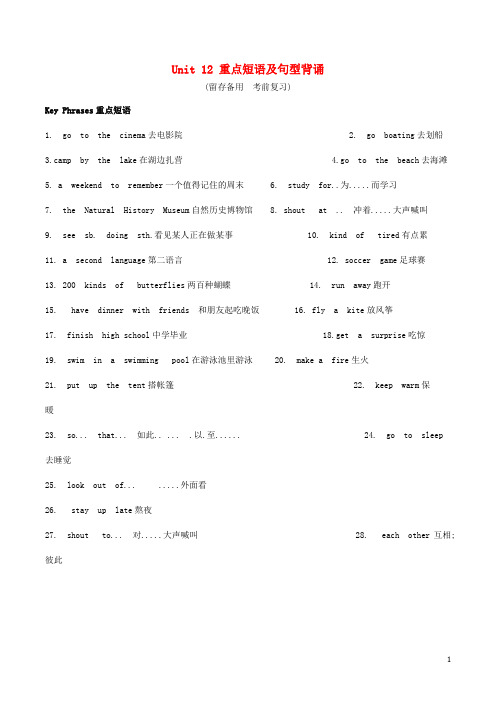
Unit 12 重点短语及句型背诵(留存备用考前复习)Key Phrases重点短语1. go to the cinema去电影院2. go boating去划船3.camp by the lake在湖边扎营4.go to the beach去海滩5. a weekend to remember一个值得记住的周末6. study for..为.....而学习7. the Natural History Museum自然历史博物馆 8. shout at .. 冲着.....大声喊叫9. see sb. doing sth.看见某人正在做某事 10. kind of tired有点累11. a second language第二语言12. soccer game足球赛13. 200 kinds of butterflies两百种蝴蝶 14. run away跑开15. have dinner with friends 和朋友起吃晚饭 16. fly a kite放风筝17. finish high school中学毕业 18.get a surprise吃惊19. swim in a swimming pool在游泳池里游泳 20. make a fire生火21. put up the tent搭帐篷 22. keep warm保暖23. so... that... 如此.. ... .以.至...... 24. go to sleep去睡觉25. look out of... .....外面看26. stay up late熬夜27. shout to... 对.....大声喊叫 28. each other互相;彼此29. play badminton打羽毛球 30. wake... up把... ... 弄醒31. up and down上上下下;起伏 32. go camping野营Key Sentences 重点句型1. What did you do last weekend? 你上周末做了什么?2. How was your weekend? 你周末过得怎样?3.I worked as a guide at the Natural History Museum. 我在自然历史博物馆当过导游。
人教版新目标英语七年级下册Unit12单元目标解读-新版

Unit12 单元目标解读新目标人教版七年级下册Unit12 What did you do last weekend? 周末活动 (Weekend activities)【单元话题】周末活动【教材内容】本单元围绕“周末活动”主题展开,运用一般过去时谈论刚刚过去的一些常见周末活动,以此展开多种形式的语言训练。
【单元教材解读】基于课程标准:英语课程标准《2011年版》指出通过英语学习使学生形成初步的综合运用语言的能力,促进心智发展,提高综合人文素养。
它包括五个维度及语言知识、语言技能、学习策略、文化意识和情感态度。
而进来核心素养的提出,也指出教师要发展学生的学科核心素养,培养学生的关键能力及语言能力、学习能力和必备品格文化品格和思维品质。
七年级的学生要求达到课标要求的三级目标,简单表述为对英语学习的积极性和初步的自信心。
能听懂有关熟悉话题的语段和简短的故事。
能读懂小故事及其他文体的简单书面材料。
能根据图片用短语和句子进行描述,编写简单的故事。
能在真实的情景中进行分角色对话表演等活动。
在学习中善于利用图画等非语言信息理解主题,能在小组合作中积极与他人合作,相互帮助,共同完成学习任务。
能意识到语言交际中存在的文化差异,能初步了解英语国家的地理位置。
基于教材:本单元分为section A,section B和self-check三个大的部分,总体来说三部分之间存在知识的宽度与难度的阶梯递进逻辑关系。
Section A部分以周末活动为主线,运用一般过去时谈论刚刚过去的一些周末活动。
1a-1c 通过Lucy的周末活动和听力输入导入本单元的话题和本部分的关键句型。
1a活动引出“谈论周末活动”的话题及所要用到的What did you do last weekend?这个句式,同时复习一些表示周末活动的动词短语,学习一些新短语,如camp by the lake, go to the beach, play badminton。
2013版新目标英语七年级下册unit12_What_did_you_do_last_weekend_Section_B

Put the phrases in order according 2c to the passage. The use them to retell the story. ___ snake went into the forest ___ put up our tents and cooked food ___ learned a useful lesson ___ saw a snake and shouted to parents for help
___ snakes can’t hear but feel things moving ___ my dad jumped up and down in his tent ___ took a bus to a small village in India ___ told stories under the moon, then went to sleep
I went to the cinema with my friends.
Hello, Bob. Did you go out last weekend?
Yes, I did. I camped by the lake with my uncle.
What kinds of animals are people 2a sometimes afraid of? Why? Make a list. I think people are afraid of tigers, lions and snakes because they’re scary.
Unit 9 What did you do last weekend?
Describe what you did on your last weekend to your classmates. My last weekend was interesting. I visited my grandparents. They lived in a small village. I fed the chickens and sheep. I went fishing with my grandpa.
兴城一中2013人教新目标英语七年级下册unit-12-What-did-you-do-last-w
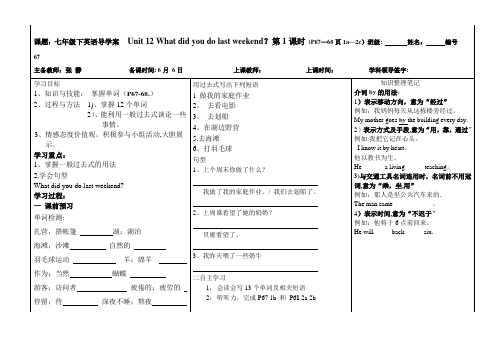
七年级下英语导学案Unit 12 What did you do last weekend?第6课时编号72 一、单词及短语扎营,搭帐篷湖;湖泊_______海滩;沙滩自然的风筝_________羽毛球运动羊;绵羊作为;当然蝴蝶飞游客;访问者疲倦的;疲劳的停留;待呼叫;喊叫深夜不睡;熬夜离开;远离跑开__________老鼠;耗子(pl.)幼小的;婴儿冲…大声叫嚷语言 (狗叫声)汪汪_________高的(地)中学以前印度帐篷耳朵搭起;举起月亮惊奇;惊讶;使吃惊;吃惊蛇移动惊慌的;吓坏了的对…大声喊叫放风筝做我的家庭作业_________ 去看电影_____________ 去划船_______________在湖边野营_____________去海滩______________打羽毛球_______________以导游的身份工作_______________自然历史博物馆_______________ 生活习惯_______________周末过得愉快_____________一点儿____________熬夜__________唱歌并弹吉他_____________________为测验而学习__________________画一个笑脸_____________ 在每一个图下面__________________弄醒;醒开始;着手跳;跃森林上上下下;起伏把…弄醒 21 到…里面;进入一个繁忙的周末________________有点难__________________待在家________________一本关于历史的书_________________访谈节目___ __四、句子翻译1、上个周末你做了什么?我做了我的家庭作业。
/ 我们去划船了。
2、上周谁看望了她的奶奶?贝姬看望了3、我昨天喂了一些奶牛4、你周末过得怎么样?5、你做了什么?我在自然历史博物馆当导游。
6、我向游客讲述蝴蝶及它们的生活习惯.7、为了看足球,我熬到深夜。
(水滴系列)七年级英语下册 Unit 12 What did you do last weekend

Unit 12 What did you do last weekend?Grammar Focus-3cTeaching and learninggoals:一、语言知识:1. Learn to use the following new words and phrases:run away, mice, mouse, baby, shout at, woof, language2. Learn to use the following sentences:What did you do last weekend?I did my homework./ We went shopping.Who visited her grandma? Becky did.Where did she go last weekend? She went to a farm.Who did she go with? She went with her classmates.二、语言功能:Learn to describe the past events using the sentence structures: What did…? Where did/ was/ were…? Who did/ was/ were…?三、学习策略:1. 能正确使用一般过去时态的各种句式来描述过去发生的事情。
2. 能灵活分辨动词过去式的规则变化和不规则变化。
四、情感态度:1. 了解掌握一门外语的重要性。
2. 让学生合理安排上学日和周末的时间,丰富课外活动,劳逸结合,享受美好生活。
【设计意图】目标引领,从四个方面表述了本节语法课的语言知识、语言功能、学习策略和情感目标。
尤其突出了对所学语法在实际生活中的运用能力的培养, 使本节课更具针对性和高效性,更贴近生活并服务于生活。
Teaching and learning steps:Step1. PreviewI.短语连线。
七年级下册英语Unit-12-What-did-you-do-last-weekend导xue
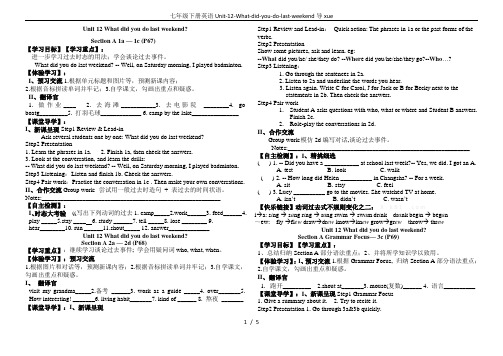
Unit 12 What did you do last weekend?Section A 1a — 1c (P67)【学习目标】【学习重点】:进一步学习过去时态的用法;学会谈论过去事件。
What did you do last weekend? -- Well, on Saturday morning, I played badminton. 【体验学习】:I、预习交流1.根据单元标题和图片等,预测新课内容;2.根据音标拼读单词并牢记;3.自学课文,勾画出重点和疑惑。
II、翻译官1. 做作业____2. 去海滩___________3. 去电影院________4. go boatg_________5. 打羽毛球_____________6. camp by the lake_______________ 【课堂导学】:I、新课呈现Step1 Review & Lead-inAsk several students one by one: What did you do last weekend?Step2 Presentation1. Learn the phrases in 1a.2. Finish 1a, then check the answers.3. Look at the conversation, and learn the drills:-- What did you do last weekend? -- Well, on Saturday morning, I played badminton. Step3 Listening:Listen and finish 1b. Check the answers.Step4 Pair work:Practice the conversation in 1c . Then make your own conversations. II、合作交流Group work: 尝试用一般过去时造句+ 表过去的时间状语。
人教版英语七年级下册教案:Unit12 What did you do last weekend ? Section B(1a-1e)
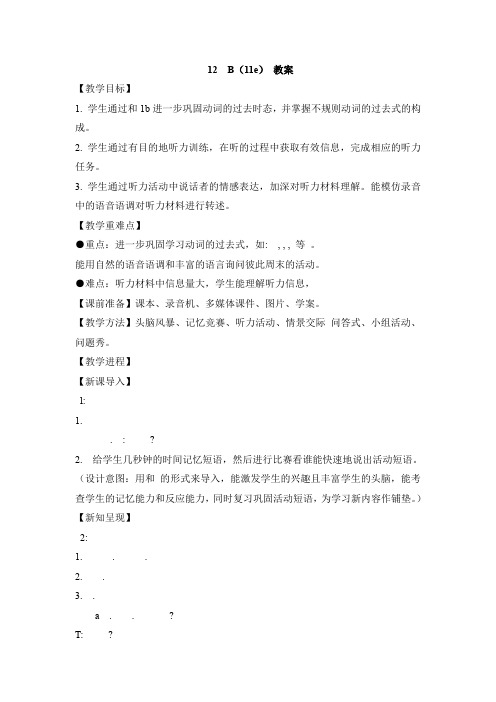
12 B(11e)教案【教学目标】1. 学生通过和1b进一步巩固动词的过去时态,并掌握不规则动词的过去式的构成。
2. 学生通过有目的地听力训练,在听的过程中获取有效信息,完成相应的听力任务。
3. 学生通过听力活动中说话者的情感表达,加深对听力材料理解。
能模仿录音中的语音语调对听力材料进行转述。
【教学重难点】●重点:进一步巩固学习动词的过去式,如: , , , 等。
能用自然的语音语调和丰富的语言询问彼此周末的活动。
●难点:听力材料中信息量大,学生能理解听力信息,【课前准备】课本、录音机、多媒体课件、图片、学案。
【教学方法】头脑风暴、记忆竞赛、听力活动、情景交际问答式、小组活动、问题秀。
【教学进程】【新课导入】l:1.. : ?2. 给学生几秒钟的时间记忆短语,然后进行比赛看谁能快速地说出活动短语。
(设计意图:用和的形式来导入,能激发学生的兴趣且丰富学生的头脑,能考查学生的记忆能力和反应能力,同时复习巩固活动短语,为学习新内容作铺垫。
)【新知呈现】2:1. . .2. .3. .a . . ?T: ?S: a .T: ?S: a( .)4. 1bT: ? a . . , a a .(设计意图:通过对每幅图片的描述,引导学生由使用旧知识过渡到自主使用新知识,达到了自然呈现的目的。
1b使用评价性的语言区分有趣和无趣的活动,通过练习学生能够完整地表达自己或他人的周末。
)【新知学习】3: 1c1. .( . T: . ? a . . , .): , ! .: . I . I .: ?: .: ?: , I a .: ? , ?: , . , I . ? ?: , I . , I a . , I .: ! !: , I . !(设计意图:教师导入听力语境,让学生明白听力要谈论话题是什么。
并且为1c的表格作铺垫,降低听力难度。
)2. .(学法指导:在听的过程中重点感受语气词的语音语调。
)3. . ? .(学法指导:由于此部分所填信息较多,播放第一遍听力时,教师可以引导学生先在旁边写重点词汇,播放第二遍听力时再核对信息,将信息转移到1c的表格中。
初中英语 七年级下册 Unit12 What did you do last weekend
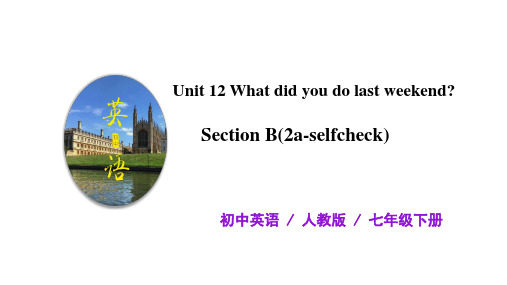
2c Put the phrases in order according to the passage. Then use them to retell the story.
__6__ snake went into the forest __2__ put up our tests and cooked food __8__ learned a useful lesson __4__ saw a snake and shouted to parents for help __7__ snakes can’t hear but can feel things moving __5__ my dad jumped up and down in his tent __1__ took a bus to a small village in India __3__ told stories under the moon, then went to sleep
Language points
1. There we put up our tents and make a fire to keep us warm and cook food on. put up 在句中意为“搭起,搭建”;另外还 有“张贴;举起(手)”之意。
他们在这里盖了一栋新房子。 They put up a new house here. 迈克正把一张地图贴到墙上。 Mike is putting up a map on the wall. 谁知道答案?请举手。 Who knows the answer? Put up your hand.
surprise还可作不可数名词,意为“惊奇;吃 惊”。其常用短语有:
in surprise to one’s surprise
最全面人教版七年级下册英语第十二单元知识点归纳总结
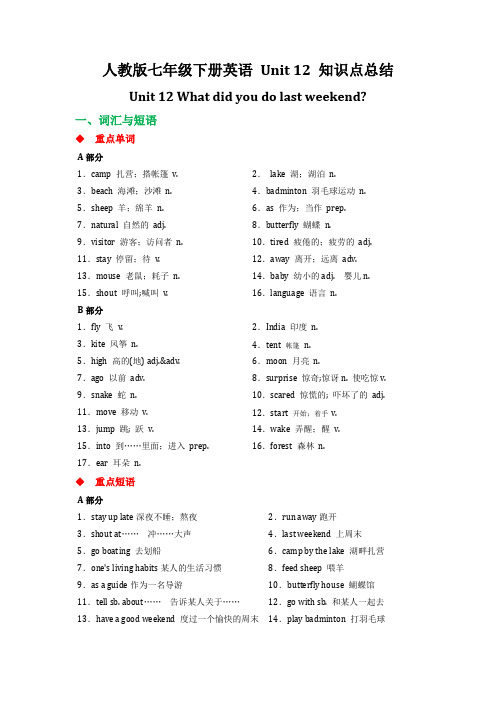
人教版七年级下册英语Unit 12 知识点总结Unit 12 What did you do last weekend? 一、词汇与短语◆重点单词A部分1.camp 扎营;搭帐篷v.2.lake 湖;湖泊n.3.beach 海滩;沙滩n.4.badminton 羽毛球运动n. 5.sheep 羊;绵羊n.6.as 作为;当作prep. 7.natural 自然的adj.8.butterfly 蝴蝶n.9.visitor 游客;访问者n.10.tired 疲倦的;疲劳的adj. 11.stay 停留;待v.12.away 离开;远离adv. 13.mouse 老鼠;耗子n.14.baby 幼小的adj. 婴儿n. 15.shout 呼叫;喊叫v.16.language 语言n.B部分1.fly 飞v.2.India 印度n.3.kite 风筝n.4.tent 帐篷n.5.high 高的(地) adj.&adv.6.moon 月亮n.7.ago 以前adv.8.surprise 惊奇;惊讶n. 使吃惊v. 9.snake 蛇n.10.scared 惊慌的; 吓坏了的adj. 11.move 移动v.12.start 开始;着手v.13.jump 跳; 跃v.14.wake 弄醒;醒v.15.into 到……里面;进入prep.16.forest 森林n.17.ear 耳朵n.◆重点短语A部分1.stay up late深夜不睡;熬夜2.run away跑开3.shout at……冲……大声4.last weekend 上周末5.go boating 去划船6.camp by the lake 湖畔扎营7.one's living habits某人的生活习惯8.feed sheep 喂羊9.as a guide作为一名导游10.butterfly house 蝴蝶馆11.tell sb. about……告诉某人关于……12.go with sb. 和某人一起去13.have a good weekend 度过一个愉快的周末14.play badminton 打羽毛球B部分1.fly a kite 放风筝2.high school 中学3.put up 搭起;举起4.each other 互相;彼此5.get a surprise 吃惊6.shout to……对……大声喊叫7.up and down 上上下下;起伏8.wake……up 把……弄醒9.a special gift 一件特殊的礼物10.take a long bus ride to 乘长途车去11.put up 搭起;举起12.keep sb. warm 使某人暖和13.on the first night 在第一个夜晚14.tell a story 讲故事15.go to sleep 入睡,睡着16.look out of 朝外看17.read a book about…读关于…的书18.know about 知道关于19.start to do sth. 开始做某事20.jump up and down 跳上跳下21.move into 搬进22.make a fire 生火23.something interesting 有趣的事情24.feel……doing sth. 觉得……正在做某事25.finish high school 高中毕业26.see……doing sth. 看见……正在做某事27.clean one's room 打扫房间28.so……that……如此……以至于……29.on Saturday night 在周六晚上30.have dinner with sb.和某人一起吃晚饭31.stay at home 待在家里32.have a busy weekend度过一个繁忙的周末33.talk show 脱口秀34.study for……为……学习◆重点句子A部分1.—What did you do last weekend? 上个周末你做什么了?—I did my homework. 我做我的家庭作业了。
人教版七年级下册英语Unit12What-did-you-do-last-weekend?知识点总结

七下Unit 12 What did you do last weekend?一、Important Phrases:1.go to the cinema 去影院★=go to the movies2.go boating/camping 去划船/野营★summer camp 夏令营3.camp by the lake 在湖边野营★by the pool在池边4.go to the beach 去海滩★on the beach 在沙滩上5.play badminton 打羽毛球play+球类/棋类名词(不加冠词)6. study for the test 备考★test=exam7.feed some sheep/cows喂羊/牛★feed(fed)on...以..为食,feed with...用...喂养8. work as a guide 做导游工作★work as +职业从事某工作9. at the Natural History Museum 自然历史博物馆★nature(n.不可数)大自然-natural(adj.)自然的10. over 200 kinds of butterflies 200多种蝴蝶★over=more than 超过11.living habits 生活习惯★make a living 谋生;eating habits饮食习惯12.kind of tired 有点累★kind of = a little13. stay up late 熬夜★stay at home 待在家,stay away from 远离,lately(adv.)最近地14.sleep early 早睡★sleepy 困的,asleep睡着的15.a family of mice 老鼠一家★mouse(单)-mice(复)16.be afraid of sth./to do 害怕★afraid=scared17.run away 跑开★take away 带走,put...away 把某物收拾好,give away 捐赠18. climb onto one’s back 爬上某人的背19. shout at/to sb.冲某人大叫★shout out 大喊出20. a second language 第二语言★mother tongue 母语21.fly a kite放风筝22.do something interesting 做有趣的事★修饰不定代词,adj.后置:anything special23.finish high school 中学毕业★finish doing sth 完成做某事24.a special gift一特殊礼物★gift=present25.take us to India 带我们去印度26.take a long bus ride 坐很久的公交车27.put up our tents 搭帐篷★put up:搭建,举起,张贴28.make a fire生火29.cook food on the fire 在火上做饭★on an open fire 明火,篝火30.tell cach other stories 互相讲故事★tell a lie 说谎,tell a joke 讲笑话31.keep sb.warm 使某人保持暖和32.sit under the moon 坐在月光下★moonlight月光,moon cake月饼33.so.......that.......如此...以致于...34.get a surprise 吃惊35. look out of...向外看★look out 小心,look for寻找,look after 照顾36. jump up and down 跳上跳下37. move into the forest 进入森林38. wake sb up叫醒某人★wake up醒来,awake醒着的39. read a book about history 读一本历史书★read...to sb给某人读...40.see an interesting talk show 看有趣的脱口秀二、Key Language Points:1.Where did you go last weekend? What did you do last weekend?上周末你去了哪里?上周末你做了什么?一般过去时的特殊疑问句:1)特殊疑问词+did+主语+v.(原)+其他?如疑问词作主语,则陈述语序,如:Who bought you this new dress?谁给你买的新裙子?2)特殊疑问词+was/were+主语+其他?Where were you last night?昨晚你在哪里?2.----Who visited her grandma? -----Becky did.为避免重复,常用do,does,did,so等代替前文提到的内容。
初中英语 七年级下册 Unit12 What did you do last weekend
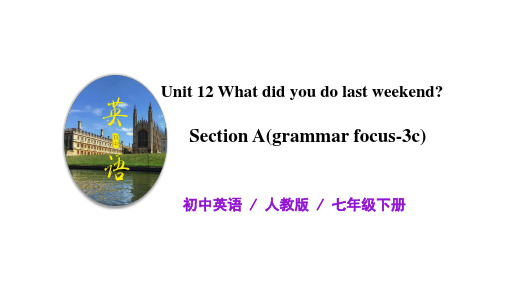
一般过去时的句式转换 1. 肯定句变否定句 (1)当句中含有情态动词 could, would, should
等时,可直接在情态动词后加 not。 You should go to the zoo first. You shouldn’t go to the zoo first.
3b Complete the passage with the correct forms
of the words in the box.
say be climb see run away
A family of mice were in the kitchen on Saturday morning when they __sa_w__ a big cat. Baby Mouse __w__a_s__ afraid and _c_li_m__b_e_d_ onto his father’s back.
(2) ① 昨天他做了什么事情? W__h_a_t_ _d_i_d_ he do yesterday?
② 上个周末她参观了什么地方? W__h_e_r_e_ _d_i_d_ she _v_i_si_t_ last weekend?
③ 你和谁一起去的动物园? _W__h_o_ _d_i_d_ you go to the zoo w__it_h_?
(2) 当句中含有 was/ were 时,可直接在was/ were 后加 not。 She was in the library yesterday. She wasn’t in the library yesterday.
(3)当句中的谓语动词是实义动词时,需在该动 词前加 didn’t,动词还原为原形。 She went to the park last week. She didn’t go to the park last week.
人教版PEP英语七年级下册 Unit 12 单元分析

played badminton, went to the beach,
went to the cinema, camped by the lake。4. 对话里呈现了一般过去时 的问答和常见的规则和不规则动词 的过去式,但规则动词变形居多。 Section A 2a-2b: 1.发生在课堂的对 话,对话里出现了一些常见的教师 反馈或鼓励用语,如Good, Great, good for you。2. 对话里出现的人物
单元课时划分
课时 Period 1 Period 2 Period 3 Period 4
课型
Listening and speaking Reading+Grammar Reading Writing
课时教学内容
Section A 1a-2c+Section B 1a-1e Section A 2d+GF-3c
用五句话描述你的上一个周末。
选择一:跟你的同伴复述Lisa的故事 选择二:你有值得纪念的周末吗?写一篇小短文来分 享你的经历
丰富写作并与同伴分享,同伴按照语法、语言、逻辑 三个层面给出评价。
都干了什么。
受到周末生活的
Section A 2a-2b: 老师 美好
和Becky, Carol, Jack之
间的对话。老师分别
询问他们三人周末干
了什么,三人一一回
答。
How
Section A 1a-1b: 1.这是一个发生在 同学之间的对话,对话的语气轻松 随意,所以对话里会出现一些比较 生活化的语气词和连词,如Hi, So, Cool, Well。2.对话的逻辑结构非常 清晰,Lucy在介绍周末经历的时候 有非常明显的时间状语,如on
2012-2013学年初一下学期英语周末辅导试卷(第18周)Unit12 What did you do last weekend

2012-2013学年初一下学期英语复习题(第18周)姓名:______________ 成绩:_______________Unit12 What did you do last weekend?II短语归纳1.do my homework2.go to the cinema3.go boating4.by the lake5.go to the beach6.play badminton7.visit my grandma8.study for the English test9.the Natural History Museum10.kind of11.stay up12.give back 13.be afraid14.play the guitar15.go to the library16.in a swimming pool17. shout at18.high school19.fly kites 、20.go camping21.put up22.make a fire23.tell stories24.each other25.go to sleep26.get a surprise27.shout to28.up and down29.wakeup30.do my homework31.on Saturday morning32.have a good weekend33.the next morning34.work as35.run away36.move intoIII用法集萃1.go+doing 去做某事2.play+球类玩……球3.时间段+ago ……前4.keep+sb./sth. +形容词/副词/介词短语使……保持……5.so+形容词/副词+that句子如此……以至于……6.see sb. doing sth.看见某人正在做某事7.let sb. do sth. 让某人做某事8.start to do/doing sth. 开始做某事IV重点句子5.I worked as a guide at the Natural History Museum.6.Really? How interesting!7.I stayed up late to watch the soccer game.8.He lost his keys. But somebody found them and gave them back to him.9.Baby Mouse was afraid and climbed onto his father's back.10.That's why it's important to learn a second language.st weekend was interesting but scary.12.There we put up our tents and made a fire to keep us warm and cook food on.13.On the first night, we just sat under the big moon and told each other stories.,14.But I was so tired that I went to sleep early.15.I was so scared that I couldn't move.16.My dad started to jump up and down in their tent.2011—2012学年度第二学期期末质量检测七年级英语试题第一节语法和词汇(共15小题,计15分)26. -----Where is Sydney? -----In __________.A. CanadaB. FrenchC. AustraliaD. Singapore27. The girl _______quite tall and ________ a medium build.A. is, isB. is, hasC. has, isD. has, has28. Be quiet! The children _________.A. sleepingB. is sleepingC. are sleepingD. be sleeping29. Mum, can you give me some _____ _______ a taxi?A. money, forB. moneys, toC. money, toD. moneys, for30. “The old man likes to _______ jokes.” our teacher _______.A. tell, toldB. tell, saidC. say, saidD. speak, said31. There _____ some beef, tomatoes and broccoli in the basket.A. beB. isC. areD. were32. Kelly, ________ girl wants to be a reporter.A. a 8-year-oldB. a 8-years-oldC. an 8-year-oldD. an 8-years-old33. Did they _______ fun in the music room? -- Yes, they had great fun _________ the music.A. have, listening toB. had, listening toC. have, hearD. had, hear34. ---- Do you know the woman ______ glasses? -Yes. And the girl _____ red is hr daughter.A. with, withB. in, withC. in, inD. with, in35. The pretty woman has ____________hair.A. curly long brownB. long curly brownC. brown curly longD. curly brown long36. ----- _____________? ----- He’s a police officer.A. What does your mother doB. What is your father doC. What does your brother like?D. What is your father37. -----Don’t run in the hallways. ------___________________.A. Yes,I do.B. No, I don’tC. Sorry, Mr. LinD. You’re welcome.38. ----- _______ do your cousin like koalas? ----- Because they are very cute.A. HowB. WhyC. WhatD. Where39. ____the morning they usually do sports. But_____ yesterday morning they cleaned their room.A. In, onB. In, /C. On, onD. In, in40. ---- Is your teacher friendly ______you? ---- Yes, he is very good ______us.A. to, toB. with , withC. to, forD. with, to第二节完形填空(共10小题,计10分)Are you good at English?Would you 41 to do well in English? Well, let me 42 you a way to learn English 43 . It is by writing diaries in English.When I 44 in Grade One, my English was not very good. My English teacher,Mr. Xu asked me to write diaries in English. At first. It was 45 difficult for me, but now I think it is very 46 . I like reading, listening and speaking.47 I often go to the Xinhua Book Store to 48 English stories for about three hours.I 49 watch often. Now I’m very good at English. I think50 diaries is one of the best ways to help you with your English study.41.A.like42.A.talk43.A.nice44.A.was45.A.a few B.wantB.tellB.fineB.fineB.a littleC.to likeC.to talkC.wellC.areC.fewD.to wantD.to tellD.goodD.wereD.little46.A.difficult47.A.Always48.A.say49.A.don’t50.A.saying B.interestingB.AfterschoolB.speakB.am notB.writingC.easyC.SometimesC.talkC.didn’tC.listeningD.boringuallyD.readD.wasn’tD.talking第三部分阅读理解(共20小题,计30分)(A)Monday… oh, I don’t like Monday because I’ll have to go back to school again after the weekend. Tuesday is not so bad.I usually play tennis with my frie nds after school. On Wednesday evening I don’t go out. I stay at home and do my homework. I like Thursday because the next day is Friday. I always go out on Friday—maybe to the cinema. I love the weekend. On Saturdays I stay in bed until(直到) lunchtime, and I sometimes go to the shops in the afternoon. In the evening we go to a club-there are good bands there every Saturday. Then on Sundays I go to my friend’s house or she comes to mine. I usually visit my grandmother for an hour in the afternoon. Then the w eekend is over and it’s Monday … and I feel bad again!51 The writer doesn’t like Monday because ________.A. Monday is the first day of a weekB. he just spent a happy weekendC. Monday is the first school day of a weekD. he will have many lessons on Monday52. The writer thinks Tuesday is not so bad because _________.A. he can play tennis with his friendsB. he has no homework to doC. he has a P.E. classD. he is free53. The writer may go to the movies on _______.A. MondayB. TuesdayC. WednesdayD. Friday54. What does the writer not do on weekends?A. Stay in bed until lunchtime.B. Watch football games on TV.C. Go to his friend’s house.D. Go shopping in the markets.55. From the text, we know that the writer ________.A. doesn’t li ke school very muchB. likes to stay at homeC. only likes FridayD. only likes Saturday(B)Mike is nine this year. He is in Grade Three. His father drives a car in a factory and his mother works in a hospital.It's a Saturday afternoon, Mike i s sitting in the room and reading a book. Kate comes up to him and says, “Brother! Mummy wants you to help her.”“What does she want me to do?” asks the boy. “To wash the apples or to cut the cakes?”“Neither,” answers Kate. “She’s watering flowers in the garden. She wants you to carry some water for her.”“Why don’t you do that?”“Mummy says I’m too young.”“Don’t you see I’m busy now?”“What are you doing here, then?”“I’m reading a book. I can’t go there.”“Is this an interesting book?”“Yes, it is.”“Well, let me help you read the book and you go to help her,” says Kate.56. There’re ____ people in Mike’s family.A twoB threeC fourD rive57 Kate is Mike’s _____.A elder sisterB young sisterC elder brotherD younger brother58 Tom doesn’t go to school because_____.A it’s SaturdayB he’s illC he wants to read the bookD he wants to help his mother 59Tom doesn’t want to help his mother because____A he’s very busyB he has some homework to doC he’s very hungryD he’s very lazy60 Kate comes to Mike and wants_____.A to read the bookB to carry waterC to water flowersD him to help their mother(C)Green Trees GymSwimming Mon. ~Sun. 8.00 a.m ~8.00 p.mBasketball Sat. ~Sun. 8.00 a.m ~6.00 p.mV olleyball Mon. ~Sat. 10.00 a.m ~6.00 p.mAerobics Mon. ~Sun. 6.00 a.m ~9.00 p.mTel: 6227225E-mail: greentrees@Fish Balls GymSwimming Mon.~Fri.6:00 a.m.~6:00 P.m.Basketball Mon.~Sun.8:00 a.m.~6:00 P.m.V olleyball Mon.~Sun.8:00 a.m.~6:00 P.m.Aerobics Mon.~Sun.8:00 a.m.~6:00 P.m.Tel:658941761. I want to go swimming on Sunday.Where Can I go?A. Green Trees Gym.B. Fish Balls Gym.C. Both A and B.D. You can’t go swimming on Sunday.62. I want to play basketball on Sunday morning. Where can I go?A. Green Trees Gym.B. Fish Balls Gym.C. Both A and B.D. Green Balls Gym.63.I play volleyball at 9:00 every morning.Where can you find me?A. Green Trees Gym.B. Fish Balls Gym.C. Both A and B.D. At home.64.I do aerobics every afternoon.So you can call me at 6589417.Do you know where I'm going to be?A. At Green Balls Gym.B. At Fish Balls Gym.C. In the school.D. On the playground.65.Which gym accepts(接受)mail on computers?A. Green Balls Gym.B. Fish Balls Gym.C. Green Trees Gym.D. Fish Trees Gym.(D)Clay is 13 years old, and he lives in Miami, the United States. On the morning of Feb.23, when Clay is waiting for school bus, a man kidnaps(绑架) him.The man takes him to a tree. He puts a stock in Clay’s mouth. Then he asks for money from Clay’s family.Clay is very scared(害怕). But he remembers there is a safety pin(安全别针) in his pocket. He takes out the pin and cuts through the rope(绳子). Finally he gets free. Clay calls his motherwith a farmer’s cell phone. Soon the police comes and Clay i s safe.The police thinks highly of(高度评价) Clay. “This man kidnaps the wrong boy,” Charly Wells, a policeman says. “This boy notices things. And he’s very brave(勇敢).”66. The man kidnaps Clay ___.A. on Clay’s way homeB. on Clay’s way to schoolC. when Clay is shoppingD. in a park67. After taking Clay to a tree, the man ___.A. kills(杀死)the boyB. hurts the boyC. asks for money from his familyD. calls the police68. Clay uses___ to help him run away.A. a ropeB. a safety pinC. a gunD. a knife69. We can tell from the story that Clay is ___.A. braveB. smartC. both A and BD. hard-working70. Why does the police say “This man kidnaps the wrong boy” Because Clay is _____A. a foreign boyB. braveC. too youngD. a policeman’s son(二) 综合填空rain, China, July 16th , play, crowded, Tuesday, decide, exciting, ourToday is 76____________, 77__________. In the morning, we went to a beautiful beach. We had great fun 78 _________ in the water. There were many people on the beach. It was very 79___________. But we enjoyed 80 ___________. In the afternoon, it 81 _________, so we 82 ___________ to go to a museum. It was interesting. I learn a lot about China 83 _________history. That made me feel very 84 _________. At last, we 85 _________ a taxi to a hotel. 第三部分写作(共15分)请从以下几个方面介绍一下你的朋友:1. 国籍、年龄、语言、居住地2. 最喜爱的电影、学科、动物及原因3. 长相、爱好4. 一起做过的事情及感受要求:要点齐全,语句通顺,意思完整,书写整洁,不少于80词。
人教版七年级英语(下)Unit12《Whatdidyoudolastweekend》微课精讲
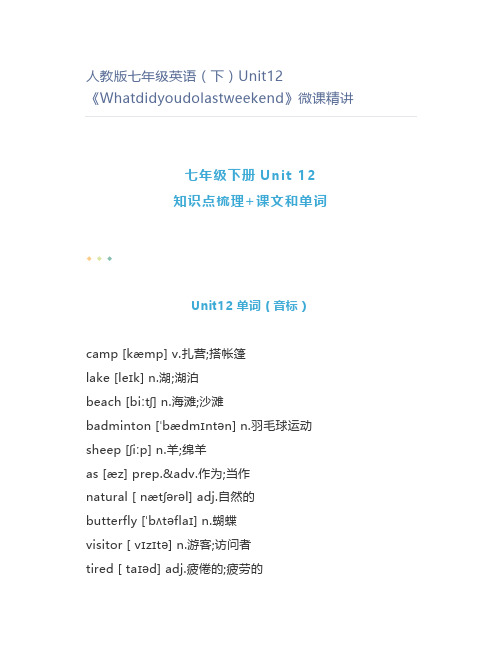
人教版七年级英语(下)Unit12《Whatdidyoudolastweekend》微课精讲七年级下册Unit 12知识点梳理+课文和单词◆◆◆Unit12 单词(音标)camp [kæmp] v.扎营;搭帐篷lake [leɪk] n.湖;湖泊beach [biːtʃ] n.海滩;沙滩badminton [ˈbædmɪntən] n.羽毛球运动sheep [ʃiːp] n.羊;绵羊as [æz] prep.&adv.作为;当作natural [ nætʃərəl] adj.自然的butterfly [ˈbʌtəflaɪ] n.蝴蝶visitor [ vɪzɪtə] n.游客;访问者tired [ taɪəd] adj.疲倦的;疲劳的stay [steɪ] v.停留;待stay up late 深夜不留睡;熬夜away [ə weɪ] adv.离开;远离run away [ rʌnəˌweɪ] 跑开mouse (pl. mice) 老鼠;耗子baby [ beɪbi] adj.&n.幼小的;婴儿shout [ʃaʊt] v.呼叫;喊叫shout a t… 冲……大声叫嚷woof int.(狗叫声)汪汪language [ læŋgwɪdʒ] n.语言fly (flew) v.飞kite [kaɪt] n.风筝fiy a kite 放风筝high [haɪ] adj.&adv.高的(地)high school 中学ago [ə gəʊ] adv.以前India [ ɪndɪə] n.印度tent [tent] n.帐篷put up [ pʊtʌp] 搭起;举起moon [muːn] n.月亮surprise [sə praɪz] n.&v.惊奇;惊讶;使吃惊get a surprise 吃惊snake [sneɪk] n.蛇scared [ /skeəd] adj.惊慌的;吓坏了的move [muːv] v.移动shout to… 对……大声喊叫start [stɑːt] v.开始;着手jump [dʒʌmp] v.跳;跃up and down 上上下下;起伏wake (woke) v.弄醒;醒wake…up 把……弄醒into [ ɪntuː] prep.到……里面;进入forest [ˈfɒrɪst] n.森林ear [ɪə] n.耳朵【重点短语】1. last weekend 上周末2. do one’s homework 做作业3. go to the cinema 看电影4. go boating 去划船5. camp by the lake 在湖边露营6. go to the beach 去海滩7. play badminton 打羽毛球8. on Saturday morning 在周六的早上9. study for the English test 为了英语考试学习10. feed some cows 喂一些奶牛11. work as a guide 做为一个导游工作12. Natural History Museum 自然历史博物馆13. butterfly house 蝴蝶馆14. over 200 kinds ofbutterflies 超过200多种蝴蝶15. tell sb about … 告诉某人关于…16. living habits 生活习惯17. be kind of tired 有点儿累19. stay up 熬夜20. play with sb. 和某人玩21. lose things 丢东西22. run away 跑开23. fly a kite 放风筝24.as a special gift 作为一个特殊的礼物25. take sb. to sp. 把某人带到某地26. go camping 去露营27. put up the tents 搭建帐篷28. make a fire 生火29. keep sb. warm 使某人保持温暖30. on the first night 在第一天晚上31.so...that... 如此…以至于…32. go to sleep 去睡觉33. get a surprise 吃惊34. see sb. doing sth. 看见某人正在做某事35. jump up and down 上蹦下跳36. climb onto one’s back 爬到某人背上37. shout at/shout to 大声喊叫38 wake …up 把...弄醒39. move into… 移入,爬进…中40. a useful lesson 有用的一课【重点句型】1.---What did you do last weekend?你上周末做了什么?---Well, on Saturday, I played badminton.噢.周六我打羽毛球了。
新人教 英语 七年级下册Unit12 What did you do last weekend知识点详解

Unit12 What did you do last weekend?知识点详解单元目标总览:【知识点详解】1、camped by the lake在湖边扎营(1)①camp 作动词,意为“扎营,搭帐篷”。
◆We go camping every summer. 我们每年夏天都去野营。
◆We walked all day and camped by a river at night.我们走了一天,晚上在一条河边宿营。
②camp 作名词,意为“露营地,度假营”。
◆Let’s go back to the camp, it’s getting dark. 让我们回营地吧,天黑下来了。
◆We spent two weeks at camp this summer. 我们今年夏天在度假营玩了两周。
(2)by介词, 意为“在……旁边”,表示位置,相当于beside。
◆Our teacher is sitting by the window. 我们老师坐在窗户旁边。
拓展:by作介词的其他常见用法:(1)表示移动方向,意为“经过”。
◆My mother goes by the building every day. 我妈妈每天从这栋楼旁边经过。
(2)表示方式及手段,意为“用,靠,通过”。
◆He makes a living by fishing. 他以捕鱼为生。
(3)与交通工具名词连用时,名词前不用冠词,意为“乘、坐、用”等。
◆I went there by bike. 我骑自行车去那儿的。
6. tired2、What did you do last weekend?上周末你做什么?What+did+主语+谓语动词原形+其他,这一特殊疑问句用来询问某人在过去某个时间或地点做过什么事情,其中did为助动词,没有人称和数的变化,谓语动词为实义动词原形。
◆—What did you do last night?昨晚你做了什么?—I visited my uncle.我看望了我的叔叔。
- 1、下载文档前请自行甄别文档内容的完整性,平台不提供额外的编辑、内容补充、找答案等附加服务。
- 2、"仅部分预览"的文档,不可在线预览部分如存在完整性等问题,可反馈申请退款(可完整预览的文档不适用该条件!)。
- 3、如文档侵犯您的权益,请联系客服反馈,我们会尽快为您处理(人工客服工作时间:9:00-18:30)。
2c Student A asks questions with who, what, or where and Student B answers. Then change roles.
Who visited her grandma? Becky did.
2d Role-play the conversation.
What did you do last weekend?
fed some sheep / cows
April
Sun Mon Tues Wedn Thurs Fri Satur 16 23 17 24 18 25 19 26 20 27 21 28 22 29 last week this week
2. ____ I did my (homework/sports).
3. ____ I studied for the (English/math) test.
4. ____ I went to a (farm/beach).
5. ____ I fed some (sheep/cows).
2b Listen again. Write C for Carol, J for Jack or B for Becky next to the statements in 2a.
3. …, but I’m kind of tired now. 但现在我有点累。 tired 作形容词,意思是疲倦的;疲 劳的;累的;厌烦的。例如: She is a little tired. 她有点累了。
4. I stayed up late to watch the soccer game. 我熬夜看足球赛。 stay up late 深夜不睡;熬夜 例如: Afterwards she relented and let the children stay up late to watch TV. 后来她宽容了些,让孩子们晚睡看电 视。
butterfly house 表示“蝴蝶馆”。
英语中house 的含义与所处的语境密切 相关。例如: a big house 表示“一座大房子”。
但是,my house 不仅表示“我的房子”, 还可表示“我的家”。例如: I hope you all can come over to my house this Sunday for coffee. 我希望这个礼拜天你们全都能够来我家 喝咖啡。
a 1. did my homework _____
2. went to the cinema ____ d 3. went boating ______ e 4. camped by the lake _____ f 5. went to the beach ______ b
c 6. played badminton ______
go to the cinema went to the cinema go — went
What did … do last weekend?
go boating went boating go — went
What did … do last weekend?
camp by the lake camped by the lake camp — camped
last weekend He is at school this week. He was at home last week. is — was
2a Listen and underline the words you hear.
1. ____ B I visited my (aunt/grandma).
1b Listen and write the day, morning, afternoon or night below each picture.
a. Sunday night b. Saturday afternoon c. Saturday morning d. Saturday night e. Sunday afternoon
Unit 12
What did you do last weekend?
Section A Period 1 (1a-2c)
What did … do last weekend?
do my homework did my homework do — did
What did …do last weekend?
f. Sunday morning
1c Role-play
B: What did you do last weekend, Lucy? A: Well, on Saturday morning, I played badminton.
What did you do last weekend?
visited aunt / grandma
What did … do last weekend?
go to the beach went to the beach
go—went
What did … do last weekend?
play badminton played badminton play —played
1a Match the activities with the pictures 〔a-f〕.
1. How interesting! 多么有趣啊! 这是个感叹句。感叹句结构是“How + 形容词或副词 that bird. How beautiful!
瞧那只鸟,多么漂亮呀!
2. They have a butterfly house with over 200 kinds of butterflies! 它们(指博物馆)有一个有200多种蝴 蝶的蝴蝶馆!
What did you do last weekend?
did my homework / sports
What did you do last weekend?
studied for the English / math test
What did you do last weekend?
went to a farm / beach
1. ____ B I visited my (aunt/grandma). B I did my (homework/sports). 2. ____ 3. ____ C I studied for the (English/math) test. 4. ____ J I went to a (farm/beach). 5. ____ J I fed some (sheep/cows).
